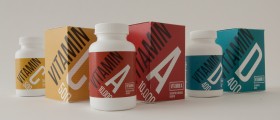
Vitamins are of utmost importance when it comes to proper and normal functioning of the human body. If a person suffers from vitamin deficiency it may lead to the development of various different types of medical conditions. One must be well informed about recommended daily intakes of each every precious vitamin and mineral, because that is the only way of maintaining proper growth, health and vitality of the entire body.
Sources of Vitamins
Vitamins are usually obtained from various different types of both animal and plant food sources. The body does not produce any vitamin by itself, so it requires a well balanced diet which includes plenty of fresh meat, fruits and vegetables. More than 65% of Americans suffers from vitamin deficiency mostly due to the fact that they consume plenty of fast foods and processed foods, while the intake of fresh vegetables and fruits is significantly low. Processed foods only provide minimal amounts of nutrients and they rarely contain any essential minerals or vitamins. They are also known for causing the deposition of fats in the human body, which leads to the development of various different types of diseases and ailments. Vitamins provide proper health, vitality and growth and they are very efficient in boosting the strength of the immune system.
Vitamin Types
Two main types of vitamins include fat soluble vitamins and water soluble vitamins. Fat soluble vitamins can be stored in the body so they do not have to be taken on a regular basis, but the water soluble ones get absorbed in the body, they cannot be stored and they need to be taken on a regular daily basis.
Vitamin Recommendations
Vitamins should be ingested by means of a healthy and well balanced diet, but for those who still suffer from deficiencies may try using various different types of vitamin supplements which are available on the market. They commonly come in the form of capsules or powders. One should always consult a physician before using vitamin supplements. The RDA stands for Recommended Daily Allowance. The RDA for biotin is 30 micrograms, the RDA for folate is 400 micrograms, the RDA for vitamin K is 120 micrograms, the RDA for vitamin E is 15 milligrams, the RDA for vitamin D is 5 micrograms, the RDA vitamin C is 90 milligrams, the RDA for vitamin B12 is 2.4 micrograms, the RDA for vitamin B6 is 1.3 milligrams, the RDA for Niacin is 16 milligrams, the RDA for riboflavin is 1.3 milligrams, the RDA for thiamin is 1.2 milligrams and the RDA for vitamin A is 900 micrograms.

















Your thoughts on this
Loading...